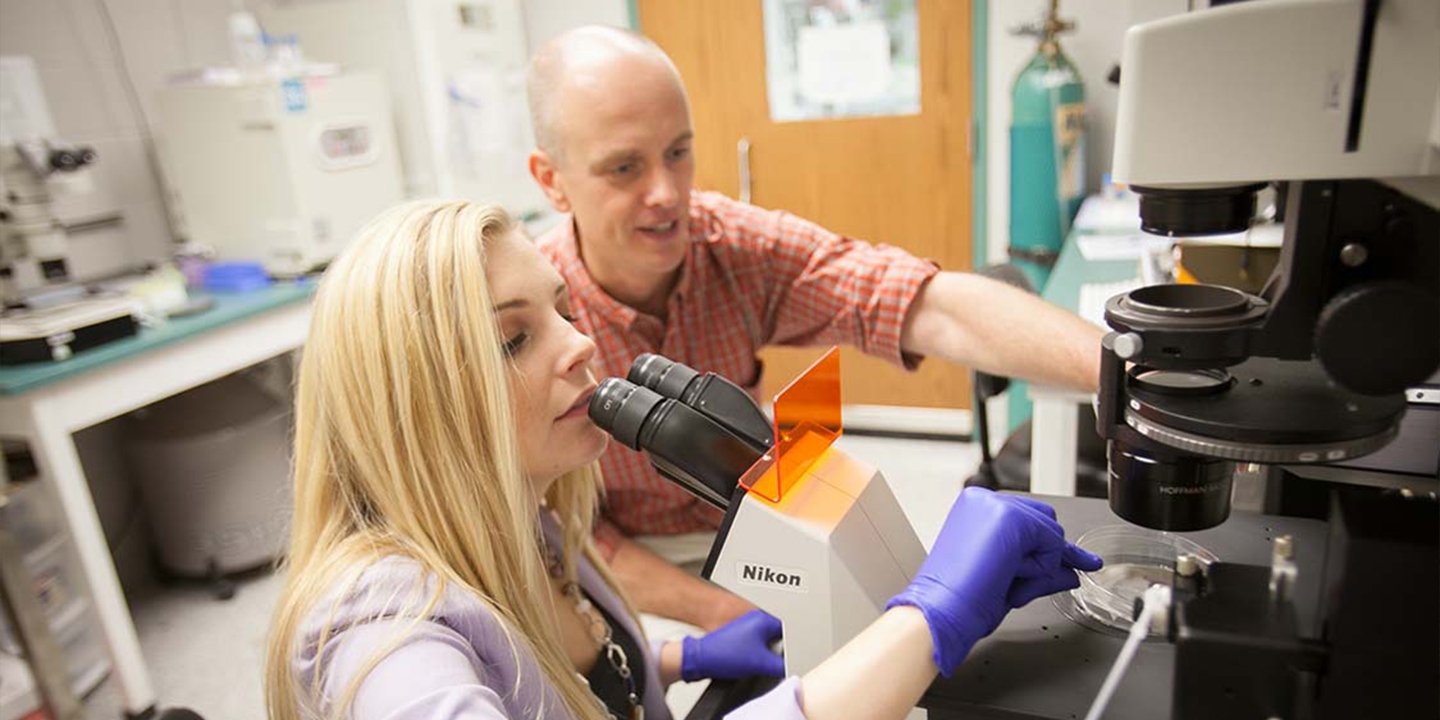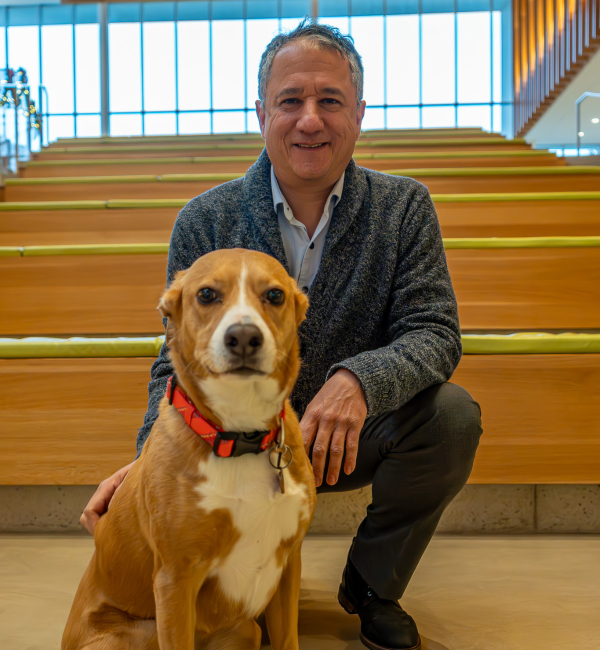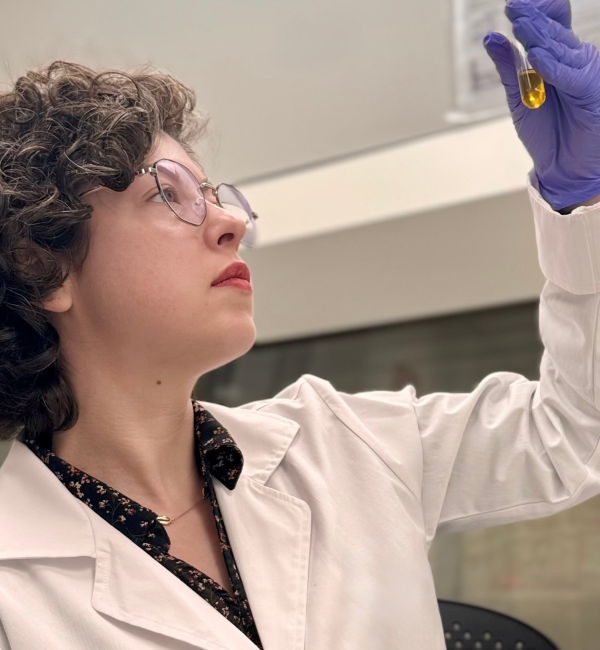Internally Funded Research
The potential for advancements in canine research is greater than ever, and Cornell has a legacy of transformative contributions upon which we can build.
Cornell offers expertise from the very beginning of the research continuum — working from molecular-level discoveries to showing how these findings translate into real-world impact. By covering the full research process, we can test how our research applies to clinical settings — empowering our clinicians to perform cutting-edge medical advancements in our hospitals and clinics.
Explore how the Cornell Richard P. Riney Canine Health Center is investing in critical, innovative and collaborative research that will help dogs live longer, healthier, happier lives.
2025 - 2026 Funded Research Projects:
Utilization of stress radiography for the diagnosis of carpal ligament disruption in a canine cadaver model
This study is aimed at improving the diagnosis of carpal (wrist) injuries in athletic and working dogs and those with genetic predisposition. It focuses on the use of stress radiography to detect joint instability caused by ligament damage. The study builds on previous pilot research that established standardized methods for acquiring stress radiographs using a custom positioning device and tensionometer to apply quantified stress forces. The researchers will analyze canine cadaver limbs harvested from dogs with normal carpi that were euthanized for unrelated reasons to establish normal ranges for carpal joint angles and joint space widths, as well as those associated with specific ligament injuries.
Eight groups of cadaver limbs will have different carpal ligaments sequentially transected (cut), and radiographs will be taken before and after each cut. Measurements of joint angles and space widths will be analyzed statistically to compare normal joints with those affected by ligament injuries. This will be the first study to objectively quantify how ligament injuries affect carpal joint angles and spaces on stress radiographs, providing standardized guidelines for diagnosing carpal instability in dogs. This research will lead to improved treatments and possibly preventative strategies.
Principal Investigator: Amy Todd-Donato, Assistant Professor, Section of Diagnostic Imaging and Radiology
Myocardial stunning during balloon valvuloplasty in dogs with pulmonic stenosis
Pulmonic Stenosis (PS), the most common congenital heart defect in dogs, involves narrowing of the pulmonary valve. This condition increases resistance to blood flow from the right ventricle to the lungs, leading to poor lung oxygenation, thickened heart muscle, eventual heart failure, and reduced survival. The primary treatment is balloon valvuloplasty, where a balloon is inserted into the valve and inflated to improve blood flow and reduce pressure. However, in some cases, pressure rebounds after the procedure, suggesting poor outcomes despite initial success.
Dr. Martin-Flores' research group has developed a method to measure heart muscle contractility during the procedure, which is challenging and requires specialized equipment. They discovered a phenomenon called “myocardial stunning," where the heart’s contractile force temporarily drops due to poor oxygenation during balloon dilation. This may falsely suggest procedural success and explain the rebound pressures observed in some dogs which portends failure of the procedure. The study aims to directly measure contractility during dilation of the valve, improve monitoring, better understand myocardial stunning, and identify factors contributing to it. Ultimately, the research seeks to develop user-friendly techniques for assessing contractility and improve treatment outcomes for dogs with pulmonic stenosis.
Principal Investigator: Manuel Martin-Flores, Professor, Section of Anesthesiology and Pain Medicine
Optimizing the response rate of canine oral squamous cell carcinoma to trametinib treatment through patient stratification
This study aim continues to improve treatment for oral squamous cell carcinoma in dogs, a highly aggressive and deadly type of oral tumor. Current treatment typically involves extensive surgery to remove the tumor and surrounding tissue, resulting in high costs, deformities, long recovery times, and significant post-surgery quality-of-life issues. Moreover, some tumors are inoperable, leaving only palliative care as an option. The researchers have tested the drug trametinib (approved by the FDA) in a clinical trial to shrink tumors before surgery, allowing for less invasive procedures, faster recovery, and fewer complications.
Early results show trametinib shrinks tumors in about 45% of dogs, with some tumors disappearing radiographically and, by visual inspection, entirely. They are focusing on identifying the dogs most likely to respond to the drug, as preliminary data suggests that dogs with a specific BRAF gene mutation are more responsive. The study will examine more dogs with BRAF mutations to confirm this relationship and assess whether extended treatment avoids drug resistance and recurrence. Tissue analysis post-surgery will determine if the cancer can be fully eliminated, which may eventually pave the way for non-surgical treatments. The ultimate goal is to make trametinib a standard therapy for OSCC in dogs, improving outcomes and quality of life.
Principal investigator: Santiago Peralta, Associate Professor, Section of Dentistry and Oral Surgery
In vitro low-dose spatially fractionated radiotherapy enhancement via chemotherapy and gold nanoparticles
This research is focused on improving treatment for canine osteosarcoma, a fast-growing cancer that spreads aggressively. Current options like surgery and chemotherapy are often ineffective, especially for non-operable cases. The researchers are exploring spatially fractionated radiotherapy (SFRT), a method that delivers high-dose radiation to tumors while sparing healthy tissues to preserve the affected limb.
While this form of fractionated therapy has been effective for other resistant cancers, combining it with chemotherapy and other agents like gold nanoparticles has not been fully studied. In preliminary trials, this form of fractionated therapy, when combined with chemotherapy or gold nanoparticles showed significant toxicity to osteosarcoma cells in a test tube setting. Gold nanoparticles enhance radiation effects by infiltrating cancer cells. This study will test the effectiveness of fractionated radiation therapy with chemotherapy and gold nanoparticles, examining its effect on both cancerous and healthy bone cells. The goal is to identify the optimal combination that maximizes cancer cell destruction while minimizing damage to healthy tissue. If successful, this approach could offer a less invasive, safer treatment for canine osteosarcoma while preserving the limb, and it might also inform treatments for similar cancers in humans.
Principal Investigator: Parminder S. Basran, Associate Research Professor, Section of Medical Oncology
Mass spectrometry and machine learning for the diagnosis of B-cell lymphoma in dogs
Lymphoma is a cancer of white blood cell called lymphocytes and accounts for about 1 in every 4 cases of cancer in dogs. Diagnosing lymphoma can be expensive, invasive, and slow, yet early diagnosis gives dogs the most treatment options and the best chance of a good outcome. This study explores a cheaper, faster, and less invasive way to diagnose lymphoma in dogs. We will use a tool called MALDI-TOF Mass Spectrometry that is available in many veterinary laboratories where it is typically used to identify bacteria. The MALDI-TOF Mass Spectrometry instrument uses a laser to vaporize cells and then measures how fast the tiny pieces of cell fly to create unique signatures or fingerprints.
We want to identify the fingerprints of cancerous and non-cancerous lymphocytes. In the first step of this project we will create a detailed catalog, or library, of these unique fingerprints using healthy and cancerous cells grown in the laboratory and with cells from dogs with lymphoma and other non-cancerous conditions. Artificial intelligence, specifically machine learning, will then be used to improve the accuracy of the MALDI-TOF Mass Spectrometry analysis by spotting patterns in the data. If successful, this approach could pave the way for applying this technique to study and diagnose other types of cancer in veterinary medicine.
Principal Investigator: Priscila Serpa, Assistant Professor, Department of Population Medicine and Diagnostic Sciences
Funded Research Project Archives
Learn more about Riney funded research on SFRT








